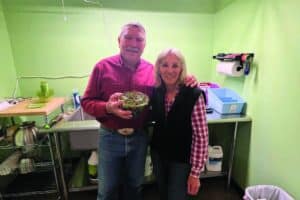Lorance Romero is a man on a mission – a mission to start biodiesel co-ops throughout Colorado. He has already started biodiesel co-ops in Denver and Boulder, and now he has set his sights on Colorado Springs.”Our use of petroleum-based fuel goes up every year, and the price keeps going up,” Romero said. “I want to get off that merry-go-round.”For many people, especially farmers, biodiesel – a diesel fuel made from animal fat or vegetable oil – can be the way to get off that merry-go-round, Romero said.The diesel engine was invented in 1919 specifically to power farm equipment, he said, and, back then, diesel fuel was made from vegetable oil. Today, diesel fuel is made from petroleum.Locally, two fuel companies, Chief Petroleum and Acorn Petroleum, sell a blend of 80 percent petroleum-based diesel and 20 percent biodiesel made in Colorado from soybeans by American Agri-Diesel.Romero said he thinks that diesel engines can burn 100 percent biodiesel in Colorado in all but the coldest months.A native of Colorado Springs, he has been making biodiesel from used restaurant oil for five years. He burns pure biodiesel in his diesel engine vehicles.To make biodiesel, Romero said he pours about 50 gallons of used vegetable oil into a tank and heats it to 120 degrees. He then adds a mixture of lye and methanol, which cause the oil to separate into glycerine and biodiesel. The glycerine settles to the bottom and is drained out. The glycerine by-product makes a good dust abatement product, Romero said.He then adds water to the biodiesel to “wash” it. The water and impurities in the biodiesel settle to the bottom of the tank and are drained out. Depending on the quality of the original vegetable oil, the biodiesel may have to be washed several times.When testing indicates the biodiesel has reached the proper purity level, it is stored and after a short period of time is ready for use.The process is called transesterfication, which results in a fuel that conforms to the ASTM D6751 specifications for use in diesel engines.Romero said there is about 75 cents wrapped up in the lye and methanol to make a gallon of biodiesel. Restaurants typically pay up to $40 per month to have used oil picked up, so he said it’s not hard to convince many restaurant owners to provide the biodiesel maker the oil at no charge.”Japanese restaurants are the best source because they change the oil in their deep fat fryers more often than fast-food restaurants,” Romero said. The next best restaurants are fish, Chinese and Mexican restaurants. Oil from restaurants like McDonald’s and Kentucky Fried Chicken is more difficult to process because of the wide variety of foods cooked in the oil and the greater length of time the oil is used, Romero said.Romero said he estimates that restaurants in the Colorado Springs area generate 600,000 gallons of waste oil per year, and 40 percent of the waste oil goes to landfills. The rest of it goes to rendering plants, where it is processed and used to make pet food, cosmetics and paint.In the United States, sales of diesel-powered passenger cars peaked in the early 1980s, Romero said. Diesel cars used to be loud, and they put out a dirty, smelly exhaust. Today’s diesel engines are quieter and cleaner, with European engine manufacturers leading the way in diesel technology. With gasoline prices so high, Romero said he expects car companies to offer more diesel engine alternatives in the future.In terms of emissions, Romero said biodiesel is 80 percent cleaner than petroleum-based diesel and 90 percent cleaner than gasoline, plus, diesel engines get better mileage and last longer than gasoline engines.Romero would like to start a biodiesel co-op in the Falcon/Peyton area. “All you need is a garage or farm building, a used 80 gallon water heater and about $100 in parts,” he said.Romero offers free workshops and seminars in the area. He conducts seminars at 2 p.m. the last Sunday of the month at Poor Richard’s Bookstore in downtown Colorado Springs. For more information, call Romero at 303-330-5187.Editor’s note: Next month, we’ll take a look at a Falcon company – Diesel Max – that uses a different process to make fuel from used restaurant oil.






